Obama Tells Wall Street to Stop Fighting Reform
Updated 1:07 p.m.
President Obama traveled to New York City Thursday, where he pointedly told members of the city's financial industry to stop fighting reasonable industry reform.
"We will not always see eye to eye," Mr. Obama said to members of the banking industry in his speech at New York's Cooper Union, not far from Wall Street. "We will not always agree. But that does not mean we have to choose between two extremes."
"We do not have to choose between markets that are unfettered by even modest protections against crisis, or markets that are stymied by onerous rules that suppress enterprise and innovation," he continued. "That's a false choice."
The president urged industry executives to join those seeking to pass reform "not only because it is in the interests of your industry, but because it is in the interests of our country."
The president said industry lobbyists have been engaged in a "furious effort" to weaken or kill the pending legislation, which has passed the House and is being debated in the Senate. He said to industry leaders present for the address - including executives from Goldman Sachs, Morgan Stanley and Bank of America - that "I want to urge you to join us, instead of fighting us in this effort."
Obama Financial Regulatory Reform Cheat Sheet
What Bipartisanship? Financial Reform Gamesmanship Back On
GOP Strategy: Hit Obama, Win or Lose
The president stressed that he did not want to kill Wall Street, a vital part of the New York City economy.
"I believe in the power of the free market," he said. "I believe in a strong financial sector that helps people to raise capital and get loans and invest their savings. It's part of what has made American what it is."
But he also lamented that some on Wall Street "forgot that behind every dollar traded or leveraged, there is family looking to buy a house, and pay for an education, open a business, save for retirement."
"A free market, he said, "was never meant to be a free license to take whatever you can get, however you can get it."
The speech to about 700 guests comes as a bipartisan agreement on financial reform in the Senate appears imminent. The White House said before the speech that it was not aimed exclusively at industry executives, though the setting - and Mr. Obama's multiple comments aimed directly at precisely that group - sent a clear message.
"It is essential that we learn the lessons of this crisis, so we don't doom ourselves to repeat it," said Mr. Obama. Without reform, he said, "our house will continue to sit on shifting sands, and our families, businesses and the global economy will be vulnerable to future crises. "
The president outlined the four planks of the planned industry reform in his remarks. The first, he said, entailed the creation of a way to protect the financial system and the broader economy if a large firm begins to fail. He noted that such a system exists for smaller banks (via the FDIC) but not for large, interconnected firms like Lehman Brothers.
"We need a system to shut these firms down with the least amount of collateral damage to innocent people and businesses," he said. "From the start, I've insisted that the financial industry - and not taxpayers - shoulder the costs in the event that a large financial company should falter. The goal is to make certain that taxpayers are never again on the hook because a firm is deemed 'too big to fail.'"
The president targeted Republicans, among them Senate GOP leader Mitch McConnell, who have suggested the legislation is actually going to encourage future taxpayer bailouts of Wall Street.
"That may make for a good sound bite, but it's not factually accurate. It is not true," he said, to applause. He said the system as it stands is what led to bailouts.
"A vote for reform is a vote to put a stop to taxpayer-funded bailouts," he said. "That's the truth. End of story. And nobody should be fooled in this debate." He later asked those involved in the debate to "put this kind of cynical politics aside."
Mr. Obama also pointed to the so-called "Volker Rule," which, he said, "places some limits on the size of banks and the kinds of risks that banking institutions can take." Those limits, he said, will instill confidence in the financial system both at home and abroad.
The second plank identified by the president was a push for new transparency in financial markets. He said that companies like AIG had been making "huge and risky bets" with derivatives and other instruments that in many ways "defied accountability, or even common sense."
"In fact, many practices were so opaque, so confusing, so complex that the people within these firms didn't understand them," he said. And while "there is a legitimate role for these financial instruments in our economy," he said -- the president pointed to examples of presidents using these sorts of instruments in a positive way -- there must be a way to "prevent reckless risk taking."
"The only people who ought to fear the kind of oversight and transparency that we're proposing are those whose conduct will fail this scrutiny," he said.
The third plank involved the establishment of consumer financial protections. "While it's true that many Americans took on financial obligations that they knew - or should have known - they could not have afforded, millions of others were, frankly, duped," he said. "They were misled by deceptive terms and conditions, buried deep in the fine print." Congress has been debating the structure and scope of a new Consumer Financial Protection Agency designed to protect consumers.
And the final plank was a plan to give company shareholders power over executive pay and corporate elections. While Americans don't begrudge success, the president said, enormous bonuses for bailed out companies are the sort of thing that "offends our fundamental values."
The president closed by saying that there had been a deployment of cash, lobbyists and rhetoric to influence the legislation, sometimes through "misleading arguments and attacks" meant to effectively destroy it.
He read an excerpt from Time Magazine reporting that bankers were worried that new legislation would destroy the banking industry -- before noting that it came from 1933, and concerned the now widely-lauded FDIC. (The story is here.)
In the end, the president said, "there is no dividing line between Main Street and Wall Street. We rise or we fall together as one nation."
Senate Democrats are currently planning to hold the first vote on the reform bill on Monday evening. That vote would be on a motion to begin debate, and would require the support of at least one Republican to break a potential filibuster. If and when the Senate passes the bill it will need to be reconciled with the House version before going to the president.


